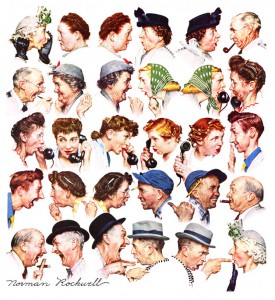Here in Baltimore, we’re buckling down the hatches and hoping to weather the storm. Unrest is expected in “the Northwest” but no one is quite sure what that means. Schools all dismissed early and it’s been recommended that children stay indoors. So far, it’s a snow day in April; iy”H it will remain so.
I’m sure some of what I say here will be controversial, but here are my opinions on the facts as I know them.
The Detention of Freddie Gray was Reasonable and Appropriate
People who have nothing to hide have no problem making eye contact with a police officer, and certainly they don’t respond to eye contact by bolting. This has nothing to do with “running while black,” and everything to do with “running from a cop.”
It is the responsibility of the Baltimore Police to keep public order. Especially in a high crime area, the fact that Gray went running off at top speed was an extremely good reason to detain him, start a conversation and find out why he was running away.
Then, upon detaining him, there was ample reason to bring him into custody. He was carrying a switchblade, which which is apparently against the law — I can’t tell you if that’s true for everyone or only for those with a criminal history, but Gray has seen the inside of a prison several times over the past 7 years. He was scheduled to be tried in May on drug charges. Officers apparently suspected he was involved in drug activity, but they never got to question him about that.
There is No Evidence (Yet) that Police did Deliberate Harm
Thanks to an abundance of cell phone videos, we know what police did when they dragged him to the van and when they put leg irons on him (apparently he was being violent). Nothing that we can see explains how he received the severe spinal injury which eventually caused his death.
According to policy, he should’ve been buckled in. If a prisoner is being violent with you, then cuffed or not it’s difficult to buckle him in without risking personal harm. The officers decided not to risk being head-butted or even bitten. I think we can understand that — but it was still wrong. If it took three officers to do it safely, then three officers should have been involved.
There was also no obvious physical injury, nothing for police to see and no indication of police brutality. The spinal injury was the only injury he suffered.
The remaining question, then, is whether the driver of the van deliberately chose to give him a “rough ride” as some sort of “payback” for being violent with them. I can’t answer that question, and I’m sure no one can until the investigation is complete.
If the arresting officers didn’t hurt him, and didn’t give him a rough ride, then how did he get hurt? Did he get jostled the wrong way? Did he slam himself into the side of the van for some reason? We may never know. The demonstrators don’t seem to be waiting.
He Should Have been given Medical Attention More Quickly
Someone being held down by police is immediately going to start saying “I can’t breathe,” in order to get police to relax enough to let them escape. A cuffed person will complain his wrists hurt — and Gray was recorded doing exactly that. Similarly, for someone detained by police to claim to need medical attention is a frequent tactic to avoid going to central booking. This last tactic just delays the process and means more time in custody.
This is something that officers know to explain, to distinguish between those just trying to delay from those who really have a problem. They ignored Gray’s complaints instead, and this was wrong as well.
The Demonstrations are Senseless
The Mayor of Baltimore is black [I would use the more politically-correct term African-American, but the hashtag is #blacklivesmatter]. The Police Commissioner is black. The majority of the city council is black. At least 25% of the police force (including, according to some reports, at least one of the arresting officers) is black. So I wonder if all these people protesting could please clarify who it is, among the mayor, police force and city council, who doesn’t think black lives matter?
Obviously, they do. Obviously, they want to find out what went wrong. Obviously, they are already working on it diligently, and not trying to cover anything up. Isn’t it incredibly premature to “take to the streets?”
No, the Mayor Didn’t Deliberately Let Them Riot
Much has been made of the following quote from Mayor Stephanie Rawlings-Blake:
I work with the police and instructed them to do everything that they could to make sure that the protesters would be able to exercise their right to free speech. It’s a very delicate balancing act, because while we tried to make sure that they were protected from the cars and the other things that were going on, we also gave those who wished to destroy space to do that as well. And we work very hard to keep that balance and to put ourselves in the best position to de-escalate, and that’s what you saw this evening.
Some have pounced on this statement, claiming that she was admitting that they intentionally provided “those who wished to destroy” with the necessary “space to do that.” But I think it’s obvious to any honest, thinking, unbiased person that this is not what she said. She said that in providing the protesters with space in which to “exercise their right to free speech,” this inadvertently gave space to “those who wished to destroy.”
Zero Tolerance Actually Works
Zero-tolerance doesn’t mean tolerance for false arrests. Zero-tolerance isn’t an excuse for officers to get it wrong, and officers shouldn’t be given quotas requiring a certain number of arrests. What zero-tolerance does mean is that even minor crimes are not tolerated. If people want to protest, and you let them congregate in legal fashion, that’s one thing. But if you let them block traffic and you don’t intervene, they will up the ante. They will throw rocks. They will destroy police cars. They will set fires.
In Israel they have the opposite problem. If something like this had happened in Jerusalem, the border police would’ve been there busting heads. As we know, the Israeli border police act completely outside the bounds of law and order, covering their nametags, wantonly clubbing bystanders and arresting people who photograph them in action (well, at least they did that third one before cellphones made it impossible to stop the photos from appearing).
Here, the police were hampered not only by numbers, but by a policy of excessive restraint in the face of not merely protests, but violence.
We can hope that tonight will be better — due to the presence of overwhelming force. But if police had been given authority to quell the protests and clear the streets, if they didn’t need to fear lawsuits if they shoved a person illegally blocking a street (the rock-throwing thugs, of course, had no such fear), it’s likely they could have regained the streets last night, and neither a CVS pharmacy nor a nearly-completed facility for the elderly would have burned to the ground.
Such is the consequence of fettering the shotrim, the people who guard us and ensure that we obey the laws — and who are authorized to use force when necessary.
Prepare for Round Two
The investigation will be completed soon. It is almost certain that whatever disciplinary action is warranted for failing to buckle Gray in or failing to respond to his medical complaints, it will hardly satisfy the mob thirsting for blood, or in this case, a charge of murder.
One can hope the Mayor has learned that its not only the demonstrators who deserve freedom to operate.
 In this week’s reading, Aharon is Commanded to light the Menorah in the Temple.
In this week’s reading, Aharon is Commanded to light the Menorah in the Temple.

 Here Rashi (Rabbi Shlomo Yitzchaki) asks a question, which has been repeated countless times as an expression meaning “what has one thing to do with the other?” “Ma Shmitta Etzel Har Sinai?” — What do the laws of Shmitta, the Sabbatical of the Land, have to do with Mt. Sinai more than any other Mitzvah? The entire (Oral) Torah was given to Moshe at Mt. Sinai — so why the emphasis on Shmitta?
Here Rashi (Rabbi Shlomo Yitzchaki) asks a question, which has been repeated countless times as an expression meaning “what has one thing to do with the other?” “Ma Shmitta Etzel Har Sinai?” — What do the laws of Shmitta, the Sabbatical of the Land, have to do with Mt. Sinai more than any other Mitzvah? The entire (Oral) Torah was given to Moshe at Mt. Sinai — so why the emphasis on Shmitta?
